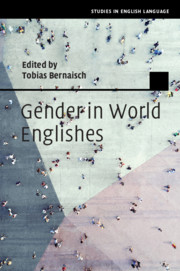Book contents
- Gender in World Englishes
- Studies in English Language
- Gender in World Englishes
- Copyright page
- Dedication
- Contents
- Figures
- Tables
- Contributors
- Chapter 1 Introduction
- Chapter 2 Localisation, Globalisation and Gender in Discourse-Pragmatic Variation in Ghanaian English
- Chapter 3 Sociolinguistic Variation in Intensifier Usage in Indian and British English
- Chapter 4 Tag Questions and Gender in Indian English
- Chapter 5 Hedges and Gender in the Inner and Expanding Circle
- Chapter 6 The Role of Gender in Postcolonial Syntactic Choice-Making
- Chapter 7 Social Constraints on Syntactic Variation
- Chapter 8 Linguistic Colloquialisation, Democratisation and Gender in Asian Englishes
- Chapter 9 Gender, Writing and Editing in South African Englishes
- Index
- References
Chapter 2 - Localisation, Globalisation and Gender in Discourse-Pragmatic Variation in Ghanaian English
Published online by Cambridge University Press: 11 December 2020
- Gender in World Englishes
- Studies in English Language
- Gender in World Englishes
- Copyright page
- Dedication
- Contents
- Figures
- Tables
- Contributors
- Chapter 1 Introduction
- Chapter 2 Localisation, Globalisation and Gender in Discourse-Pragmatic Variation in Ghanaian English
- Chapter 3 Sociolinguistic Variation in Intensifier Usage in Indian and British English
- Chapter 4 Tag Questions and Gender in Indian English
- Chapter 5 Hedges and Gender in the Inner and Expanding Circle
- Chapter 6 The Role of Gender in Postcolonial Syntactic Choice-Making
- Chapter 7 Social Constraints on Syntactic Variation
- Chapter 8 Linguistic Colloquialisation, Democratisation and Gender in Asian Englishes
- Chapter 9 Gender, Writing and Editing in South African Englishes
- Index
- References
Summary
The plethora of studies dealing with the quotative systems of English-as-native-language (ENL) varieties shows that the choice for be like is influenced by several linguistic and social factors. As for gender, most studies indicate that women are the prime users of be like. However, it is still unclear whether the same applies to English varieties that have emerged in countries with gender profiles differing from those found in ENL countries. This paper presents a case study of the quotative system of Ghanaian English based on a preliminary version of ICE-Ghana. The findings reveal that be like entered a quotative system that has been reshaped by language contact. Nonetheless, the new quotative still occupies a similar linguistic niche as that found in ENL varieties. Concerning social factors, the findings point towards a decreasing probability of be like with increasing age, but do not show a female lead. An intriguing interaction term between age and gender suggests that women in the sample are less likely to use be like the older they become compared to men. I argue that these patterns of genderlectal variation may be rooted in gender inequalities in international migration that were even stronger in the past.
Keywords
Information
- Type
- Chapter
- Information
- Gender in World Englishes , pp. 23 - 46Publisher: Cambridge University PressPrint publication year: 2021
